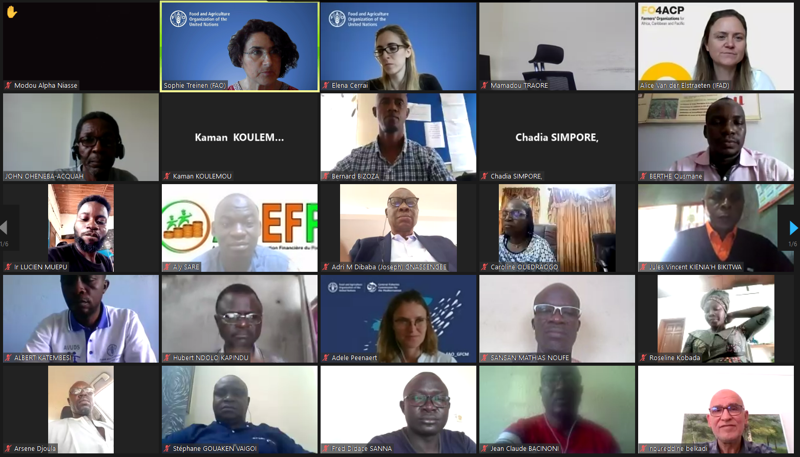The 5th webinar in the series on experience capitalization looked at the final phase of the capitalization process, adding value through adoption, adaptation, scaling up and systematic integration of capitalization into organizations’ activities.
The capitalization process does not end with the sharing of ideas and knowledge. Its main objective is to use them to generate tangible changes and to increase the impact and effectiveness of our work. The adoption, adaptation and scaling up of an intervention should be in our minds from the very beginning of the experience capitalization process, if not from the very first stages of the design and start of the intervention. In this context, capitalization becomes an essential tool for validating what worked, what didn’t and why, and for understanding what can and should be taken to scale. It also helps us to understand what adaptations will be needed to successfully scale up. It gives us a qualitative vision that is complemented by the quantitative data provided by a good monitoring and evaluation system.
This valorization process is rarely simple or linear: it may go through stages of adoption and adaptation before going to scale. Mainstreaming refers to the development of the links, practices and procedures that are needed to ensure that experience capitalization becomes regular practice within an organization. It is therefore important to advocate within the organization so that the stages of the experience capitalization process become part of the organization’s regular activities. You will also need to ensure that the necessary resources are available, anticipate potential problems and challenges, and make sure that the process is well known and understood by everyone in your organization.
In conclusion, it is important to remember that a participative learning-by-doing process, such as experience capitalization, not only gathers knowledge from a large number of participants, but also develops the skills and capabilities of these people. The integration of learning from experience therefore has a significant impact on the capabilities of an organization as a whole.
Since the end of March, the YenKasa Africa regional initiative has been organising a series of webinars on capitalising on experience. The Food and Agriculture Organization of the United Nations (FAO) and the International Fund for Agricultural Development (IFAD), together with the OPenACP-FO4ACP Programme, have co-facilitated the webinars in this six-part series.
Experience capitalization is a systematic, iterative and participative process that consists of analysing and documenting experiences to generate knowledge that can be shared and used to bring about change. It is an essential methodology for organizations to learn from past experience and improve future performance. The capitalization of experience can be applied to different sectors of activity, in different contexts, including agriculture, fisheries, forestry, health, education and many others.
Brief summary of the webinars
- The 1st of six webinars presents the units of the online course. It emphasizes the importance of involving all stakeholders in the capitalization process, to ensure that the multitude of viewpoints and therefore different experiences are taken into account.
- The 2nd webinar, devoted to preparing the experience capitalization process, comprises two stages: scoping and planning.
- The 3rd webinar focused on collecting, organizing and analysing data and information.
- The 4th webinar dealt with documentation and sharing.
- The 5th webinar looked at the value of any capitalization process
- The 6th concludes the series with examples of partners and questions and answers on how to capitalize effectively.
Video recordings of the webinars are available on the YenKasa Africa YouTube channel.
Through this series of webinars, YenKasa Africa, the communication initiative for family farming and rural development in Africa, is building the capacity of its members to better share their knowledge and experience. The webinars complement and do not replace the online course on “Capitalizing on experience for continuous learning” available on the FAO Digital Academy website. The online course is available in four languages: English, French, Spanish and Russian. How to access the video course.
Exchanges with participants continue after each webinar in the community of practice on experience capitalization: Dgroups.
When you join this 400-member community of practice, you’ll have access to presentations, a Q&A history and the chance to ask your own questions.
If you want to stay informed about YenKasa Africa’s activities, sign up for our monthly newsletter.
The next webinar on experience capitalization will be devoted to sharing examples carried out by YenKasa Africa partners, and to questions and answers with participants.
Mark your calendars for 27 June at 11 a.m. CEST = UCT+1, Universal Time+1, which means
- 9.00 for Abidjan, Bangui, Bamako, Conakry, Dakar, Lomé, Rabat, Sao Tomé, Ouagadougou
- 10.00 for Algiers, Bangui, Brazzaville, Kinshasa, Malabo, Ndjamena, Niamey, Porto Novo, Tunis
- 11.00 for Brussels, Luxembourg, Paris, Rome
- 12.00 for Addis-Ababa, Antananarivo, Asmara, Moroni, Nairobi.
To take part in the last webinar, which takes place on 27 June, please register here: https://fao.zoom.us/meeting/register/tJAkc-muqj0jG9GxRp6eFsu8mWtVzKRJGtU1
Once you have registered, you will receive a link to the webinar.
It is important to note that the webinar takes place on ZOOM. If you go to the FAO e-learning Academy, you will access the online course, but not the webinar.

